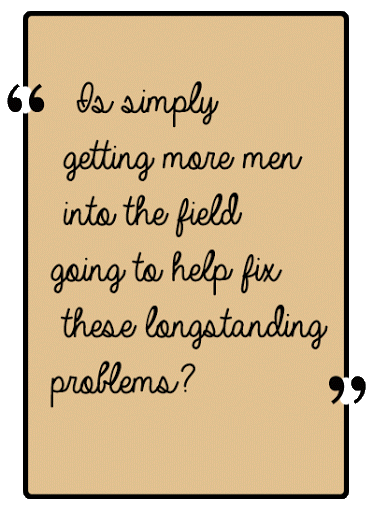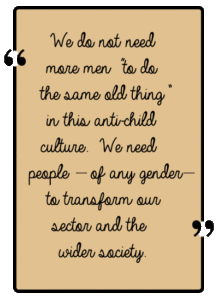 Anybody in the Early Years blogosphere, or really anyone paying attention knows that men remain practically non-existent in the field of childcare and education. Looking after babies and young children is still considered to be and in many ways remains “women’s work.” The flip-side of this sexist cliché is that us men who do care for and educate babies and young children are out of the ordinary, questionable and to many people’s eyes weirdos who are possible threats to their children. I have my stories of not being allowed to change nappies, ignorant comments and weird looks from others but they’ve been repeated by others plenty of times and it is not the scope of this blog post.
Anybody in the Early Years blogosphere, or really anyone paying attention knows that men remain practically non-existent in the field of childcare and education. Looking after babies and young children is still considered to be and in many ways remains “women’s work.” The flip-side of this sexist cliché is that us men who do care for and educate babies and young children are out of the ordinary, questionable and to many people’s eyes weirdos who are possible threats to their children. I have my stories of not being allowed to change nappies, ignorant comments and weird looks from others but they’ve been repeated by others plenty of times and it is not the scope of this blog post.
The ignorance I have faced from some has hurt my feelings and at times made me question my internalised notions of worth “as a man.” It’s ignorant and a symptom of sexist views of childrearing. I truly appreciate the support from anybody who has made me feel welcome in this profession. That said, I feel there is a disproportionate attention paid to what I and the other handful of men face versus than the regular, accepted everyday sexism face by a field of underpaid, over worked and disrespected women. Never mind the mountains of evidence that shows the first five years, and more so the first two, in being crucial to our successful development as humans. In most people’s eyes our field remains glorified babysitting, populated by women who can’t “get real jobs” and just want to “play with kids” all day. Is simply getting more men into the field going to help fix these longstanding problems?
I also have to say that being a man has worked to my advantage as well. Many forward-thinking settings are quick to hire and support the involvement of men. Furthermore there are really more than enough men in the higher ends – research, owners of settings, policy wonks, educational leaders, consultants, etc – of the field, especially given how few of us are day-to-day, frontline educators. I think this is partially the self-selecting process of the men who are drawn to this field despite it being an uncommon choice. I also think sexism plays a large role in it, with men being generally expected to be the big thinkers, doers and bosses of many areas of life.

This is not a zero sum game. I agree that our (collective) children should have a chance to develop relationships with a wide variety of people but it is hard for me to get too excited about getting more men involved in early years care and education at face value. Of course, it would be good for children to see men engaged in caring roles but the more important questions to me are the when’s, what’s, and how’s of our work, not the who’s. When, in our busy schedules do we get a chance to truly reflect on our practice as a team? What informs our pedagogy and practice? How do we relate to and interact with our children? (And another note how much are we getting paid?).
Most people – of any gender – do not understand early childhood development or respect the deep intelligence or emotional lives of babies and young children. Sadly, this includes many people, yes, mostly women, working in Early Years. We do not need more men “to do the same old thing” in this anti-child culture. We need people – of any gender – to transform our sector and the wider society.
 David Cahn is an Early Years Teaching Assistant in Leeds, UK, who blogs at childcarebrofessional.wordpress.com He is not a Montessorian, but rather a follower of the “Three G’s”: Magda Gerber, Alison Gopnik & Peter Gray.
David Cahn is an Early Years Teaching Assistant in Leeds, UK, who blogs at childcarebrofessional.wordpress.com He is not a Montessorian, but rather a follower of the “Three G’s”: Magda Gerber, Alison Gopnik & Peter Gray.